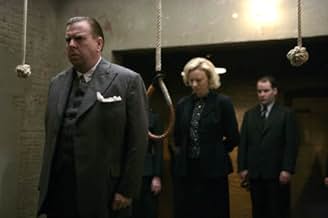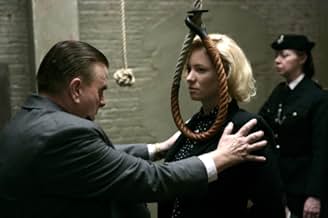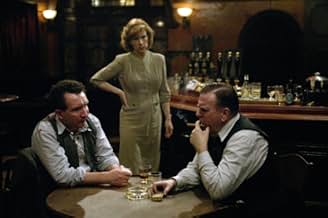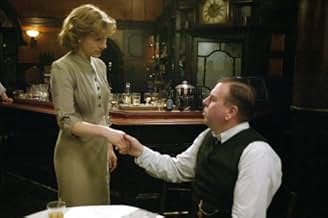NOTE IMDb
7,4/10
5,9 k
MA NOTE
Ajouter une intrigue dans votre langueThe life and times of Albert Pierrepoint - Britain's most prolific hangman.The life and times of Albert Pierrepoint - Britain's most prolific hangman.The life and times of Albert Pierrepoint - Britain's most prolific hangman.
- Réalisation
- Scénario
- Casting principal
- Nomination aux 1 BAFTA Award
- 2 victoires et 4 nominations au total
Lizzie Hopley
- Dorothea Waddingham
- (as Elizabeth Hopley)
Avis à la une
Capital punishment in Great Britain was abolished in 1964. Prior to that date there were many Home Office appointed Hangmen, none more prolific than Albert Pierrepoint, who served from 1932 to 1956, during which time he hanged an estimated 433 men and 17 women.
Following his father Henry and uncle, Thomas, into the family 'trade', Pierrepoint became the number one hangman in Britain and his career brought him into contact with many notorious criminals including "Lord Haw-Haw" ("Germany Calling"), real name William Joyce; John George Haigh, the famous "acid bath murderer"; Derek Bentley, still a controversial case and the subject of the 1991 film LET HIM HAVE IT; Ruth Ellis, the last woman to be hanged in Britain, and again the subject of a movie, DANCE WITH A STRANGER (1985); gangster, Antonio "Babe" Mancini; Theodore Schurch, the last person to be executed for treason in Britain. Perhaps the most controversial case in Pierrepoint's career was that of Timothy Evans, whose wife and baby daughter had been found murdered at their home at 10 Rillington Place, also the home of one John Reginald Christie. Evans was executed in 1950. Christie was later charged with the murders of seven women and hanged in 1953. Evans was eventually granted a posthumous pardon in 1966. Evans was played harrowingly by John Hurt in the 1971 movie 10 RILLINGTON PLACE, with Richard Attenborough as a chilling Christie (according to John Hurt on the DVD commentary for 10 RILLINGTON PLACE, Pierrepoint himself actually offered his services, under an assumed name, as technical adviser for the hanging scene in that film as the actual method was covered by the Official Secrets Act and, ever the professional, Pierrepoint wanted it re-creating accurately, and nor would he have wished his work to be misrepresented).
Pierrepoint's body of work (if you'll forgive the expression) was greatly affected by World War II, and he worked all over Europe including Germany, Cyprus, Gibraltar and Austria. It is believed that in 1945 he hanged 190 men and 10 women war criminals at Hameln prison in the British controlled sector of Germany, including Irma Greese, Elizabeth Volkenrath, Juana Boreman and the "Beast of Belsen", Josef Kramer. During the war itself he had assisted his uncle Thomas in the execution of 16 American soldiers, condemned by Court Martial for murder and rape, at a military prison in Somerset. The movie carefully portrays Pierrepoint the man, not Pierrepoint the executioner. When he does his work he leaves Albert Pierrepoint outside. He is totally professional: he doesn't care who they are or what they've done, all that matters to him is that they are human beings who have to die and he will achieve that as quickly and humanely as possible. All that matters to him is height, weight and physical condition. He is also portrayed as compassionate. When organising the order of the hanging of the German war criminals he selects a girl, who has just accused him of doing the Jews work for them, to be hanged first. His army assigned assistant agrees as she's an 'arrogant bitch'. 'No,' says Pierrepoint, 'she's the youngest. She'll be the most frightened.' And after the deed he insists that the remains be treated with due reverence: 'They've paid the price. They're innocent now. D'y'see?' The publicity surrounding the Nazi war criminals disturbs Pierrepoint, as people applaud him in the street and buy him drinks in the newly acquired pub owned by himself and his wife. This isn't right to him. What he does, his job, is private, he does not even discuss it with his wife. All this attention isn't right. Also there is now an ever growing movement opposed to capital punishment. To some he is a national hero, to an increasing number of others he is a murderer. He starts to question his role. Timothy Spall, known as a dry, comedic actor on British TV (AUF WIEDERSEHEN, PET) and usually the slimy, slightly dopey, comic villain in movies like HARRY POTTER and LEMONY SNICKETT, is mesmerising as Pierrepoint. He portrays a quiet, gentle man, and one who regards his profession with honour and pride. He is appointed by the Government; he is the best in the land. His is not to question the law or the decisions of the lawmakers; his is to do his duty to the best of his ability. And he does. Only when his own notoriety, the hanging of his friend and the changing mood of the country toward capital punishment creep into the melting pot, does his resolve start to falter, and only when the various prison authorities start haggling over payments for his services, something he sees as an insult to his position as Chief Executioner, does he consider resigning, which of course he finally does. There are a few historical inaccuracies and inconsistencies (such as the main fact that he was not the last executioner. Capital Punishment continued for another eight years after Pierrepoint's resignation) but this is the norm for this kind of movie, and on the whole the film is as accurate as any film covering over 20 years in 90 minutes. The acting is excellent in all quarters, particularly Juliet Stevenson, though Spall leads by a length. The period is very well captured and is a close cousin to VERA DRAKE in this respect. The main thing about this movie is that it lingers with you and makes you want to think and learn more about its subject. With Pierrepoint's 'clients' having played such a large part in cinema history, it's time we had a movie about the man himself. And this is it. Recommended.
Following his father Henry and uncle, Thomas, into the family 'trade', Pierrepoint became the number one hangman in Britain and his career brought him into contact with many notorious criminals including "Lord Haw-Haw" ("Germany Calling"), real name William Joyce; John George Haigh, the famous "acid bath murderer"; Derek Bentley, still a controversial case and the subject of the 1991 film LET HIM HAVE IT; Ruth Ellis, the last woman to be hanged in Britain, and again the subject of a movie, DANCE WITH A STRANGER (1985); gangster, Antonio "Babe" Mancini; Theodore Schurch, the last person to be executed for treason in Britain. Perhaps the most controversial case in Pierrepoint's career was that of Timothy Evans, whose wife and baby daughter had been found murdered at their home at 10 Rillington Place, also the home of one John Reginald Christie. Evans was executed in 1950. Christie was later charged with the murders of seven women and hanged in 1953. Evans was eventually granted a posthumous pardon in 1966. Evans was played harrowingly by John Hurt in the 1971 movie 10 RILLINGTON PLACE, with Richard Attenborough as a chilling Christie (according to John Hurt on the DVD commentary for 10 RILLINGTON PLACE, Pierrepoint himself actually offered his services, under an assumed name, as technical adviser for the hanging scene in that film as the actual method was covered by the Official Secrets Act and, ever the professional, Pierrepoint wanted it re-creating accurately, and nor would he have wished his work to be misrepresented).
Pierrepoint's body of work (if you'll forgive the expression) was greatly affected by World War II, and he worked all over Europe including Germany, Cyprus, Gibraltar and Austria. It is believed that in 1945 he hanged 190 men and 10 women war criminals at Hameln prison in the British controlled sector of Germany, including Irma Greese, Elizabeth Volkenrath, Juana Boreman and the "Beast of Belsen", Josef Kramer. During the war itself he had assisted his uncle Thomas in the execution of 16 American soldiers, condemned by Court Martial for murder and rape, at a military prison in Somerset. The movie carefully portrays Pierrepoint the man, not Pierrepoint the executioner. When he does his work he leaves Albert Pierrepoint outside. He is totally professional: he doesn't care who they are or what they've done, all that matters to him is that they are human beings who have to die and he will achieve that as quickly and humanely as possible. All that matters to him is height, weight and physical condition. He is also portrayed as compassionate. When organising the order of the hanging of the German war criminals he selects a girl, who has just accused him of doing the Jews work for them, to be hanged first. His army assigned assistant agrees as she's an 'arrogant bitch'. 'No,' says Pierrepoint, 'she's the youngest. She'll be the most frightened.' And after the deed he insists that the remains be treated with due reverence: 'They've paid the price. They're innocent now. D'y'see?' The publicity surrounding the Nazi war criminals disturbs Pierrepoint, as people applaud him in the street and buy him drinks in the newly acquired pub owned by himself and his wife. This isn't right to him. What he does, his job, is private, he does not even discuss it with his wife. All this attention isn't right. Also there is now an ever growing movement opposed to capital punishment. To some he is a national hero, to an increasing number of others he is a murderer. He starts to question his role. Timothy Spall, known as a dry, comedic actor on British TV (AUF WIEDERSEHEN, PET) and usually the slimy, slightly dopey, comic villain in movies like HARRY POTTER and LEMONY SNICKETT, is mesmerising as Pierrepoint. He portrays a quiet, gentle man, and one who regards his profession with honour and pride. He is appointed by the Government; he is the best in the land. His is not to question the law or the decisions of the lawmakers; his is to do his duty to the best of his ability. And he does. Only when his own notoriety, the hanging of his friend and the changing mood of the country toward capital punishment creep into the melting pot, does his resolve start to falter, and only when the various prison authorities start haggling over payments for his services, something he sees as an insult to his position as Chief Executioner, does he consider resigning, which of course he finally does. There are a few historical inaccuracies and inconsistencies (such as the main fact that he was not the last executioner. Capital Punishment continued for another eight years after Pierrepoint's resignation) but this is the norm for this kind of movie, and on the whole the film is as accurate as any film covering over 20 years in 90 minutes. The acting is excellent in all quarters, particularly Juliet Stevenson, though Spall leads by a length. The period is very well captured and is a close cousin to VERA DRAKE in this respect. The main thing about this movie is that it lingers with you and makes you want to think and learn more about its subject. With Pierrepoint's 'clients' having played such a large part in cinema history, it's time we had a movie about the man himself. And this is it. Recommended.
I saw this DVD twice and read all the other user comments of this recent film before I considered I was ready to write my opinion on IMDb.com.
Capital punishment in the UK was abolished in 1965 and since then it has remained a controversial topic on which MPs have been given a free vote in the House (no whips office involved) and it has consistently been voted down by MPs ever since.The arguments for capital punishment range from "an eye for an eye"; why must the State keep killers alive at the public expense; as an example to other malefactors; to provide revenge for the bereaved families of the murder victim.I suppose the most controversial case cited for reimposing the death penalty stemmed from the Moors Murderers case from 1966, Ian Brady and Myra Hindley who died in custody.Even though they could not judicially be hanged, no Home Secretary since then has considered it politic to release or commute their sentence because of the expected public and media fury.Of course today in Britain killers are routinely sentenced "to life imprisonment" which depending on the circumstances, does not necessarily mean the killer's whole life.
Against this argument is the Christian doctrine of forgiveness and whether the State is executing an innocent man e.g.Timothy Evans (hanged by Pierrepont) instead of John Reginald Halliday Christie for the murder of Evans' baby daughter.
Albert Pierrepoint was certainly not "The Last Hangman" in the UK as I believe he resigned shortly after executing Ruth Ellis in 1955 after a continuous career as Chief hangman stretching from 1933 and as I said above. killers were hanged in the UK right up to 1964.In his 1974 auto- biography he turned against capital punishment with distaste as he considered it was merely the State exacting revenge and solved nothing.Considering he executed 608 murderers we must respect his opinions.I suspect those that advocate execution would not like to do the act personally as long as there is someone else to do it and bear the crushing guilt on their conscience.
Juliet Stevenson gives a marvellously understated performance as Anne Pierrepoint, Albert's wife and provides the home life and comfort to her husband.She is also the business brains in the marriage.We see the chilling, technical efficiency and speed which convinced the Allied powers in 1946 that a British hangman was the best for dispatching the many Nazi war criminals sentenced to death at Nuremburg.Albert was informed by the brigadier that the first batch to be hanged in a day was 13 with many more to come.Albert did not want to know what evil the condemned had done and tried to ensure he kept himself personally and professionally detached when performing his duties for the State.He even had a sense of compassion for the condemned by trying to complete the hanging in less time than his father's average of 13 seconds to reduce the fear and suffering in them.In one notable case he was done in 7 1/2 seconds.Likewise at Nuremburg he decided to hang the condemned female Belsen guards first with the youngest going first as she would be the most frightened.
To my knowledge this is the first film which accurately shows the technical method of hanging that was used in British prisons.It was ignorance by film producers of this that made their films unconvincing when showing a hanging scene as hangmen were advised to keep their methods entirely secret from the public.
All credit must go to Timothy Spall in the central pivotal role and the whole production team in evoking capital punishment in a Britain between 1932- 1955.
Capital punishment in the UK was abolished in 1965 and since then it has remained a controversial topic on which MPs have been given a free vote in the House (no whips office involved) and it has consistently been voted down by MPs ever since.The arguments for capital punishment range from "an eye for an eye"; why must the State keep killers alive at the public expense; as an example to other malefactors; to provide revenge for the bereaved families of the murder victim.I suppose the most controversial case cited for reimposing the death penalty stemmed from the Moors Murderers case from 1966, Ian Brady and Myra Hindley who died in custody.Even though they could not judicially be hanged, no Home Secretary since then has considered it politic to release or commute their sentence because of the expected public and media fury.Of course today in Britain killers are routinely sentenced "to life imprisonment" which depending on the circumstances, does not necessarily mean the killer's whole life.
Against this argument is the Christian doctrine of forgiveness and whether the State is executing an innocent man e.g.Timothy Evans (hanged by Pierrepont) instead of John Reginald Halliday Christie for the murder of Evans' baby daughter.
Albert Pierrepoint was certainly not "The Last Hangman" in the UK as I believe he resigned shortly after executing Ruth Ellis in 1955 after a continuous career as Chief hangman stretching from 1933 and as I said above. killers were hanged in the UK right up to 1964.In his 1974 auto- biography he turned against capital punishment with distaste as he considered it was merely the State exacting revenge and solved nothing.Considering he executed 608 murderers we must respect his opinions.I suspect those that advocate execution would not like to do the act personally as long as there is someone else to do it and bear the crushing guilt on their conscience.
Juliet Stevenson gives a marvellously understated performance as Anne Pierrepoint, Albert's wife and provides the home life and comfort to her husband.She is also the business brains in the marriage.We see the chilling, technical efficiency and speed which convinced the Allied powers in 1946 that a British hangman was the best for dispatching the many Nazi war criminals sentenced to death at Nuremburg.Albert was informed by the brigadier that the first batch to be hanged in a day was 13 with many more to come.Albert did not want to know what evil the condemned had done and tried to ensure he kept himself personally and professionally detached when performing his duties for the State.He even had a sense of compassion for the condemned by trying to complete the hanging in less time than his father's average of 13 seconds to reduce the fear and suffering in them.In one notable case he was done in 7 1/2 seconds.Likewise at Nuremburg he decided to hang the condemned female Belsen guards first with the youngest going first as she would be the most frightened.
To my knowledge this is the first film which accurately shows the technical method of hanging that was used in British prisons.It was ignorance by film producers of this that made their films unconvincing when showing a hanging scene as hangmen were advised to keep their methods entirely secret from the public.
All credit must go to Timothy Spall in the central pivotal role and the whole production team in evoking capital punishment in a Britain between 1932- 1955.
This film details the life and career of Albert Pierrepoint, the Lancashire hangman and owner of the pub 'Help the Poor Struggler' from the 1930s through to the 1960s. His profession is in the blood - following in his father's footsteps - but until the war he stayed anonymous, not even discussing matters with his wife.
Timothy Spall does well in the lead, although the historical accuracy is questionable in places. As a character study it works well, but ultimately it is a fairly depressing watch. The quotation at the end makes clear that Pierrepoint did become disillusioned with his quick and dispassionate job, moving from pride in the speed of his work to the feeling that something is inherently wrong with one person causing another's life to end with deliberate calculation.
Pierrepoint is a film which raises a lot of questions, but ultimately treats them in a superficial way. Historical cases well documented such as Evans and Ellis pass by without much note, which depersonalises them and makes their inclusion something of a lost opportunity.
Timothy Spall does well in the lead, although the historical accuracy is questionable in places. As a character study it works well, but ultimately it is a fairly depressing watch. The quotation at the end makes clear that Pierrepoint did become disillusioned with his quick and dispassionate job, moving from pride in the speed of his work to the feeling that something is inherently wrong with one person causing another's life to end with deliberate calculation.
Pierrepoint is a film which raises a lot of questions, but ultimately treats them in a superficial way. Historical cases well documented such as Evans and Ellis pass by without much note, which depersonalises them and makes their inclusion something of a lost opportunity.
I booked this independent little British film to show at Coalville's Century Theatre, on the Non-Theatrical circuit. Titled "Pierrepoint" here in the UK, this is a case of another quality British film being routinely ignored by the multiplexes in favour of the usual fodder presented for the masses. I was confident my regular audience would be interested by this true story of mass executioner Albert Pierrepont who really was 'a household name' in the 50s and 60s. In actual fact, Mr Pierrepoint was NOT 'the last hangman' in the UK. It really is a remarkably entertaining picture considering the obviously dour storyline, much aided by the portrayal of charismatic star Timothy Spall, who can be relied upon to always give an interesting and engrossing performance. Mr Spall is no matinée idol lead but not many would argue he is one of the most popular actors in Britain today. The film explains how Albert followed in the same 'career' of his father and Uncle Tom (who is briefly portrayed in the film), and interestingly reveals the technical side of his skillful and efficient methods for a successful result! Along the way, Albert is seen with Field Marshal Montgomery, who personally recommended Pierrepoint to carry out the Nuremburg executions, as well as other familiar people such as Timothy Evans, Derek Bentley and Ruth Ellis, all of whose cases fed the argument for the abolition of capital punishment. In the film, much dramatic use is made of Pierrepoint's execution of his friend, 'Tish', who often sang duets with Albert in the latter's pub. This really is true, very much a case of stranger than fiction. This film is strangely entertaining, never dull, although I noted some of the female members of my audience were regularly looking downwards whenever a hanging was shown. However, afterwards, there many favourable comments about this film and we were still talking about it at the post show drink in the pub afterwards! Obviously achieved on a very restricted budget, but a film to be recommended.
The Last Hangman Review
Mike Reynolds
It's a dirty job, but someone's got to do it. The clock strikes nine and the hangman goes to work, getting rid of criminals the old fashioned way. At the end of the day he puts on his cap and heads home to his wife like any other man. But what goes on in the head of an ordinary person who's job it is to kill? This is the question asked by Adrian Shergold, the director of The Last Hangman.
The film follows the true story of the rise of Britain's most prolific executioner, Albert Pierrepoint, and his struggle to be a lead a normal life. Pierrepoint is played by Timothy Spall, most noted for his great supporting roles in Vanilla Sky and The Last Samurai. Spall shines in this film, becoming both a calculating, intense killer and a jolly pub mate. As the film progresses, he literally transforms as his burden becomes greater. Juliet Stevenson plays Annie, Albert's arguably supportive wife. She portrays the guilt and paranoia of an English housewife painfully well. Through her, we see the full story of the couple's social and moral difficulties.
Pierrepoint's only real drive is that of any honest, hard working man. He just wants to be good at what he does. This keeps the audience in a emotionally conflicting state. The viewer desperately wants Albert to resign from his chilling career, while cheering on his incredible success.
The film is very nice to look at. What a feat. One can only imagine the difficulty of shooting a period piece independently. It was very interesting seeing the gritty grey streets of a wartime London recorded on 16. It seemed to give it a charming modern context, though there were jarring out of focus shots here and there. One memorable scene is brilliantly spliced with actual footage of a capital punishment protest.
Aside from the physical shooting of the film, there were strong symbolic devices at use. In order to hang someone efficiently, Pierrepoint would calculate the prisoner's height and weight. To do this he would look through a small peephole in the heavy cell door. Whenever anyone is shown through a crack, or a hole, it's a hint of grizzly foreshadowing. The method of passing time was artfully portrayed as well. Pierrepoint kept a logbook of all the people who he killed, their names written in perfect script. The stack of logbooks got bigger and bigger as years went by.
Films like The Last Hangman are important because they challenge our choices. This story makes us think of what we're responsible for in our lives and careers. Is the success worth the death of your inner self? That decision is up to us. Because the saddest thing about Albert Pierrepoint is that he applied for the job.
Mike Reynolds
It's a dirty job, but someone's got to do it. The clock strikes nine and the hangman goes to work, getting rid of criminals the old fashioned way. At the end of the day he puts on his cap and heads home to his wife like any other man. But what goes on in the head of an ordinary person who's job it is to kill? This is the question asked by Adrian Shergold, the director of The Last Hangman.
The film follows the true story of the rise of Britain's most prolific executioner, Albert Pierrepoint, and his struggle to be a lead a normal life. Pierrepoint is played by Timothy Spall, most noted for his great supporting roles in Vanilla Sky and The Last Samurai. Spall shines in this film, becoming both a calculating, intense killer and a jolly pub mate. As the film progresses, he literally transforms as his burden becomes greater. Juliet Stevenson plays Annie, Albert's arguably supportive wife. She portrays the guilt and paranoia of an English housewife painfully well. Through her, we see the full story of the couple's social and moral difficulties.
Pierrepoint's only real drive is that of any honest, hard working man. He just wants to be good at what he does. This keeps the audience in a emotionally conflicting state. The viewer desperately wants Albert to resign from his chilling career, while cheering on his incredible success.
The film is very nice to look at. What a feat. One can only imagine the difficulty of shooting a period piece independently. It was very interesting seeing the gritty grey streets of a wartime London recorded on 16. It seemed to give it a charming modern context, though there were jarring out of focus shots here and there. One memorable scene is brilliantly spliced with actual footage of a capital punishment protest.
Aside from the physical shooting of the film, there were strong symbolic devices at use. In order to hang someone efficiently, Pierrepoint would calculate the prisoner's height and weight. To do this he would look through a small peephole in the heavy cell door. Whenever anyone is shown through a crack, or a hole, it's a hint of grizzly foreshadowing. The method of passing time was artfully portrayed as well. Pierrepoint kept a logbook of all the people who he killed, their names written in perfect script. The stack of logbooks got bigger and bigger as years went by.
Films like The Last Hangman are important because they challenge our choices. This story makes us think of what we're responsible for in our lives and careers. Is the success worth the death of your inner self? That decision is up to us. Because the saddest thing about Albert Pierrepoint is that he applied for the job.
Le saviez-vous
- AnecdotesDespite the title Pierrepoint was not Britain's last hangman. He retired in the mid 1950s, shortly after executing Ruth Ellis. Britain never had a "last hangman", as the last two executions before suspension of capital punishment were carried out in different cities at the same time. The last two people executed were both guilty of the murder of John West, so it was decided to carry out the sentence at the same time in Aug 1964. People were still being sentenced to death In November 1965.
- GaffesThe Hamelin war criminal hangings took place in an execution chamber at the end of a cell corridor within the old prison itself, not in an aircraft hangar. Pierrepoint described this very clearly in his memoirs.
- Citations
Albert Pierrepoint: I did a lot of jobs in Germany. More than were really good for me. Too many really. I get so bloody tired now...
- ConnexionsFeatured in Adolf Hitler: The Greatest Story Never Told (2013)
- Bandes originalesMakin' Whoopee
Music by Walter Donaldson
Lyrics by Gus Kahn
Performed by Timothy Spall and Eddie Marsan
Meilleurs choix
Connectez-vous pour évaluer et suivre la liste de favoris afin de recevoir des recommandations personnalisées
- How long is Pierrepoint: The Last Hangman?Alimenté par Alexa
Détails
- Date de sortie
- Pays d’origine
- Langue
- Aussi connu sous le nom de
- Pierrepoint: The Last Hangman
- Lieux de tournage
- Sociétés de production
- Voir plus de crédits d'entreprise sur IMDbPro
Box-office
- Montant brut aux États-Unis et au Canada
- 23 192 $US
- Week-end de sortie aux États-Unis et au Canada
- 2 028 $US
- 3 juin 2007
- Montant brut mondial
- 824 856 $US
- Durée
- 1h 30min(90 min)
- Couleur
- Mixage
- Rapport de forme
- 1.85 : 1
Contribuer à cette page
Suggérer une modification ou ajouter du contenu manquant


































